A dialogue with a Brexit MP
Here is my conversation, by letter, with my MP, who supports Brexit, though the majority of his constituents voted to remain in the European Union.
The conversation originated with me sending an email about parliamentary approval for invoking Article 50, but the main thread arose from asking him the question:
Under what conditions would you change your position on Brexit?
Essentially his response was that he may change his mind if the economic circumstances did worsen, but that his main reason for voting out was due to democratic control. Below (8th April 2017) is the text of my letter responding to that point and a few others. I will update this page if I get an answer.
Update: 15th November 2017
A quick but feeble response from my Brexit MP. He doesn’t dispute the data I presented, he added no data sources himself yet still maintains that Windsor voted to leave, contrary to all evidence, and has ended the discussion. Where is the integrity and accountability of our Members of Parliament?
Next step: Parliamentary Commissioner for Standards!
Update: 28th October 2017
Here is my letter to my Brexit MP requesting he retract his false statement that the Windsor constituency voted to leave the EU.
Update: 22nd October 2017
After the election I resent the letter (8th April 2017) that he tried to ignore, and here is the latest episode in the ongoing Brexit dialogue.
In his response he ignores most of the issues I raised. He misrepresents my position on democracy; I did not say anything about leaving the EU and benefits, or otherwise, to democracy.
However, most importantly, he continues to make the false claim that his constituency voted to leave, even though the official figures for the whole borough were 53.9% remain.
I have looked at the actual figures, for those parts of the constituency where the count was reported by ward. These were not part of the Royal Borough of Windsor and Maidenhead, which only reported the borough total. In other words, some wards of the Windsor constituency were in RBWM, but were not counted individually.
So, the Windsor wards that were counted give a vote in favour of leave of 50.7%. In his letter Afriyie, bizarrely, calls this a massive leave majority.
Taking all the available information (as shown in table below) into account the best he could say is that there was a remain majority of 51.6%.
I will be writing to him to retract his misleading statement that Windsor voted to leave.
Update: 5th May 2017
I wrote to my MP nearly a month ago and he has waited until now, until just after the general election has been called, to say that he can’t respond because a general election has been called. Who pays the salary for these people?
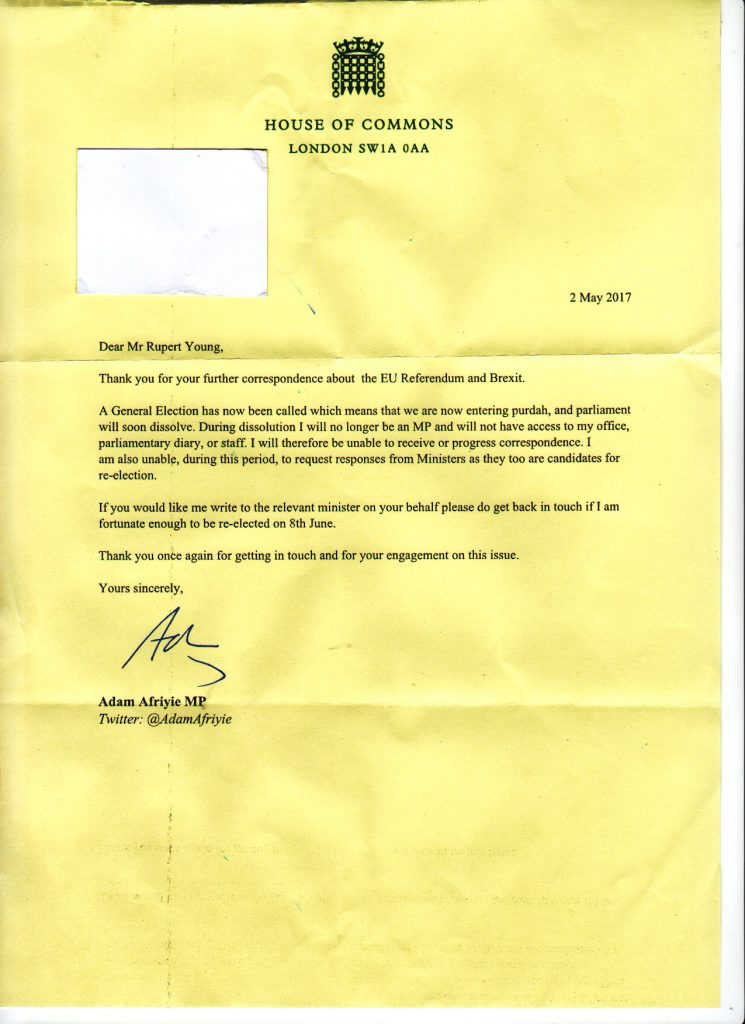
8th April 2017
In response to your letter of 27th February 2017 I would like to address a few points you raise regarding Brexit. I respect that you take a different position to myself, and the majority of your constituents, but I hope you will consider my points carefully and thoughtfully. Those of us who voted not to leave the European Union do not raise these issues lightly or for ideological reasons, but because we have serious, and valid, concerns not only about the future prosperity of the country, but also for its very existence.
1. Democracy
I take issue with your assertion that membership of the European Union means that we lack democracy. It is, in fact, the case that we do have the power to ‘vote the buggers out’. And by ‘we’ I mean we the citizens of the European Union. Why do you restrict your definition of ‘we’ to a lesser political grouping of human beings? Why not Scotland, or Berkshire, or England?
There is little difference between pan-European democracy and democracy within the United Kingdom. Both are representative democracies whereby individuals only have the power to vote for local representatives who represent them in a larger political construction. My individual vote doesn’t give me any more say who is to be the ‘bugger’ in Slough or Newcastle than who is to be the ‘bugger’ in Mönchengladbach or Brussels. I can only vote for the ‘bugger’ in Windsor; to use your own colloquialism.
Those in Scotland can not ‘vote the buggers out’, in Westminster. Neither can we in Berkshire ‘vote the buggers out’ (in Westminster). In nearly 40 years of voting I have never had the government that I wanted, so I have never been able to ‘vote the buggers out’, and that is just within the United Kingdom. That is the form of democracy that we have.
The position you take becomes a reductio ad absurdum argument beyond the arbitrary grouping you define. Will you be forming the Berkshire Independence Party, so that we, in Berkshire, can take back control and can ‘vote the buggers out’? Should I declare independence for my apartment, so that I can repatriate sovereignty to my living room and have sole control over my sofa?
2. Economy and Trade
You say that you are optimistic about our trading and economic future. But what is your basis for that optimism? As far as I can see this is just wishful thinking. What is your basis for thinking that the UK can strike trade deals that compensate for the loss of our preferential trading arrangement with the EU? Any comprehensive trade agreements that we make with non-EU countries are likely to involve freedom of movement and the supply of cheap goods and services that undermine our own. Both of these were significant reasons for leaving the European Union in the first place, so what will we have gained?
May I also point out that the United Kingdom has never been an independent, global, free-trading nation previously. Before we were in the European Union we were, for hundreds of years, part of another very large trading bloc, known as the the British Empire. Our prosperity was dependent upon many other countries. Our prosperity was dependent upon being in a large trading bloc, as it is now. However, these days we can not make trading arrangements down the barrel of a gun as we did in the past.
The modern world of trade requires cooperation and collaboration, and that means that some decisions on the form that that trade would take would need to be made jointly. That has been the nature of our arrangement with the European Union, to make trade easier for all of us across Europe. Leaving the European Union, but continuing to trade, on a lesser deal, will mean that trade is more difficult and costly and that we still have to adhere to the outcome of decisions made, but no longer have a say. How can that be sensible or represent being in control?
3. Reconsideration
I am glad to hear that you are not a fanatic, that you do not take an ideological stance on Brexit and that you are prepared to reconsider your position should the economic outcomes worsen by 2030. The problem with that is that by the time we get to that point it will probably be too late to return to where we were. Scotland may have gained independence and Northern Ireland may rejoin the Republic of Ireland, and, so, the United Kingdom will no longer exist. It may be the case that any trade deals we strike do not compensate for the economic loss due to changes in our existing EU deal. It may be the case that many businesses close and jobs are lost due to trading on WTO rules or with a poorer EU deal.
Would it not be wise to seriously assess and consider the impact of leaving before we actually do so? Just being optimistic about the future is not an adequate approach as it relies upon intangible hope rather than a sober evidence-based evaluation of the likely future. If the impact is properly assessed then we have the opportunity to change our minds before the point of no return.
If Brexit does turn out to be a catastrophe, it is not going to matter to millionaires such as yourself, but the rest of us are going to be buggered! If that happens are you, and other Brexiters, going to take responsibility and be personally accountable for the decision you have made?
The United Kingdom is a great country and is at its greatest when it works together with other countries as equals. Due to geography and shared values, the other countries of Europe are our natural partners. Rather than isolating ourselves from our closest neighbours, the great influence we enjoy from our unique historical background affords us the opportunity to be leaders in the European project, to progress our own values, the values upon which the European Union is founded, and to shape the future of the continent. That opportunity should not be underestimated or squandered; our very existence depends upon it.
[8th April 2017] Here is the original letter.
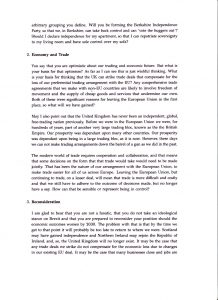
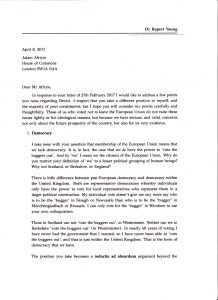
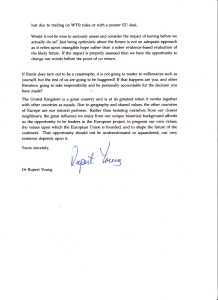
[27th February 2017] My MP’s answer to the main question. The answers though are rather vague, and inaccurate statements about democracy and sovereignty.
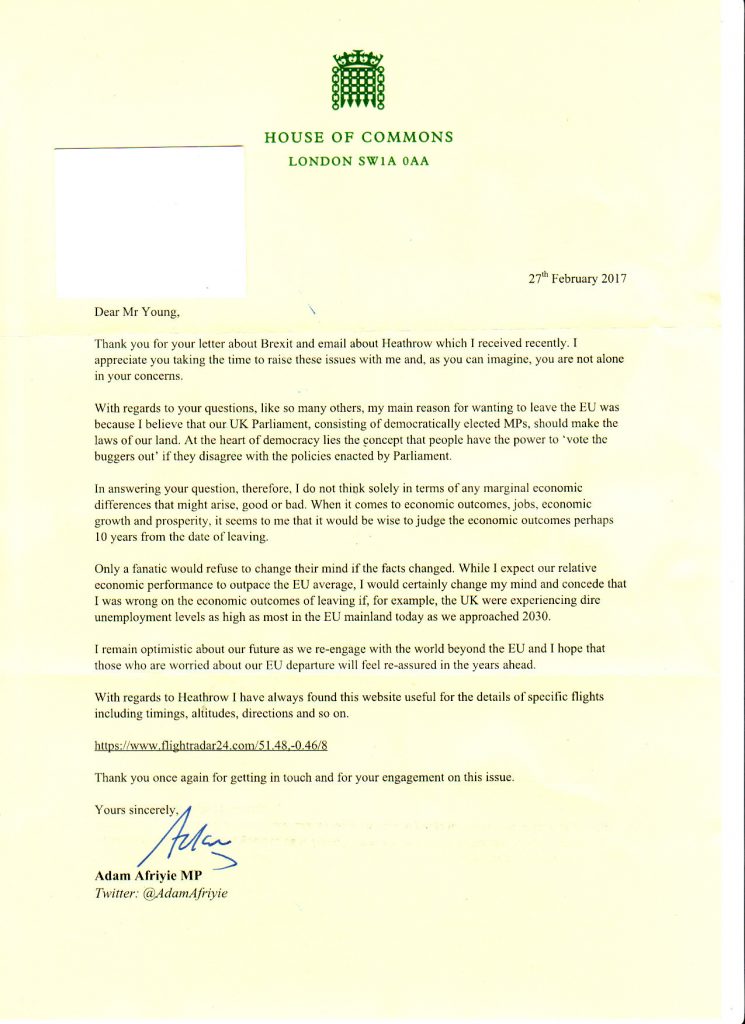
[12th February 2017] My response asking the main question, also with my answer to the question.
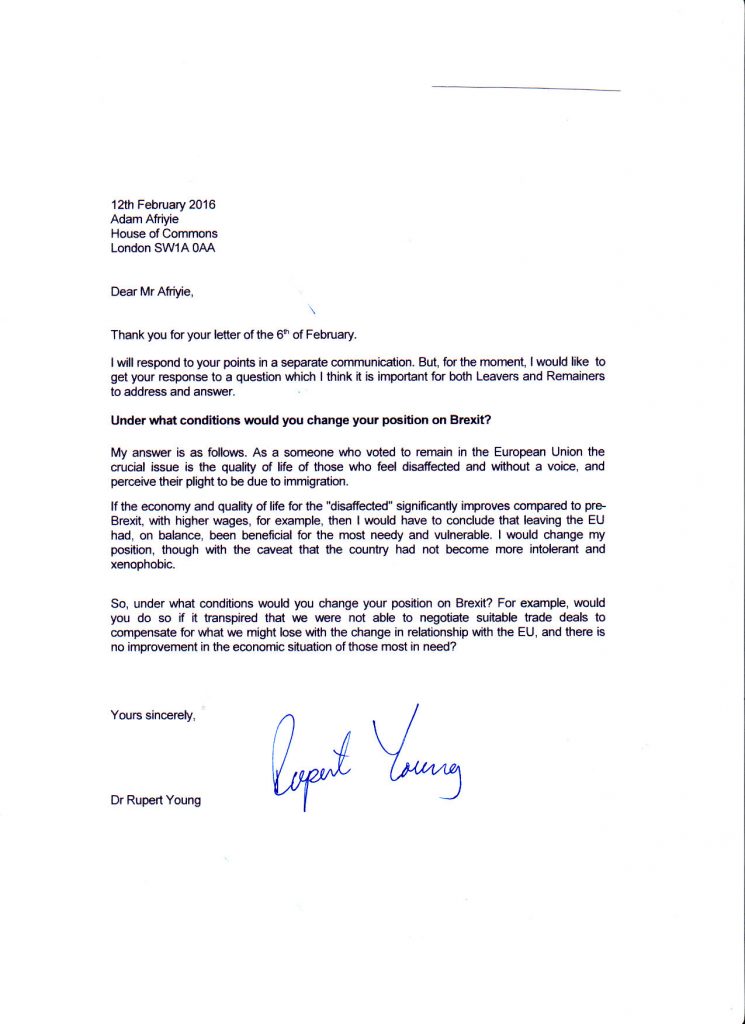
[6th February 2017] The first letter, in which he makes some extremely biased and erroneous statements, such as “an overwhelming majority” of the British people voted to leave the EU.
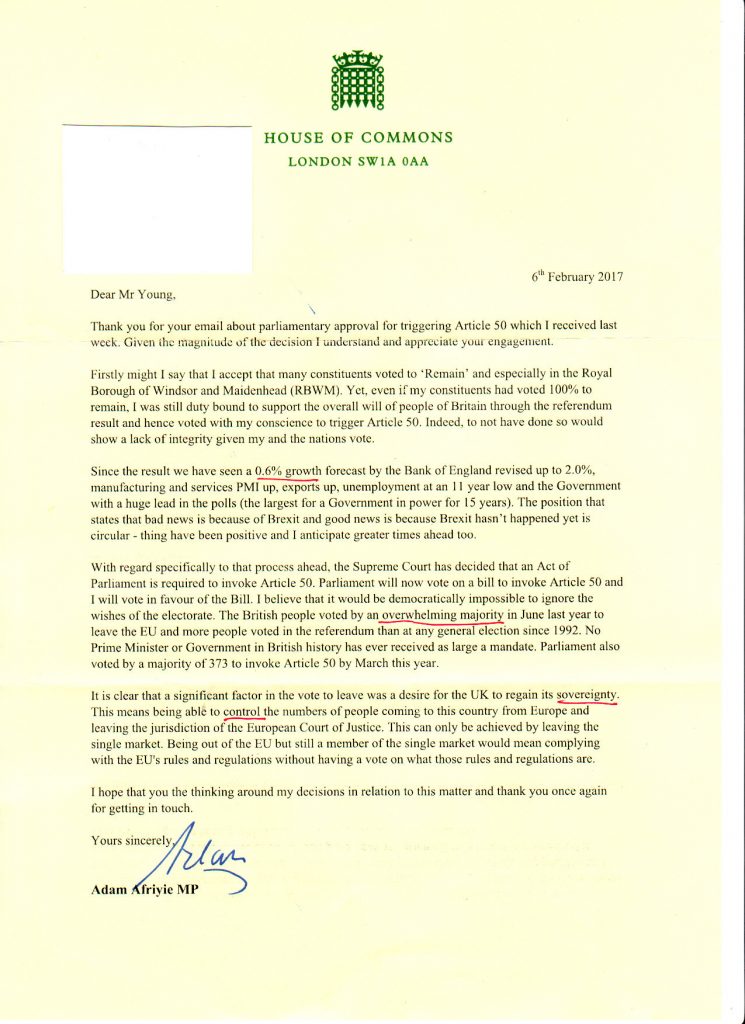

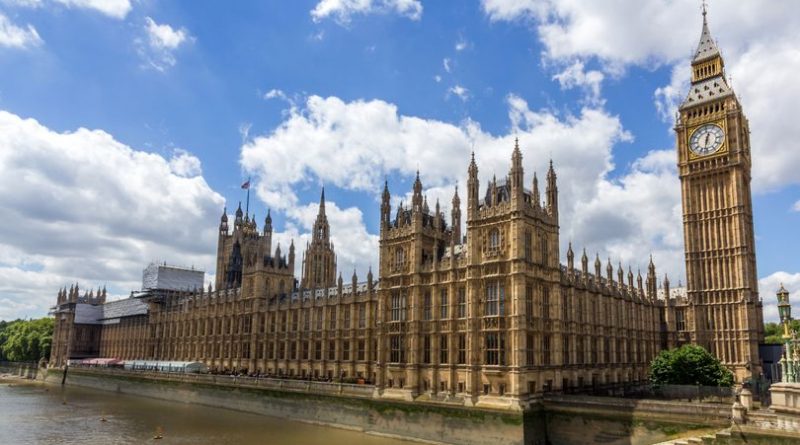
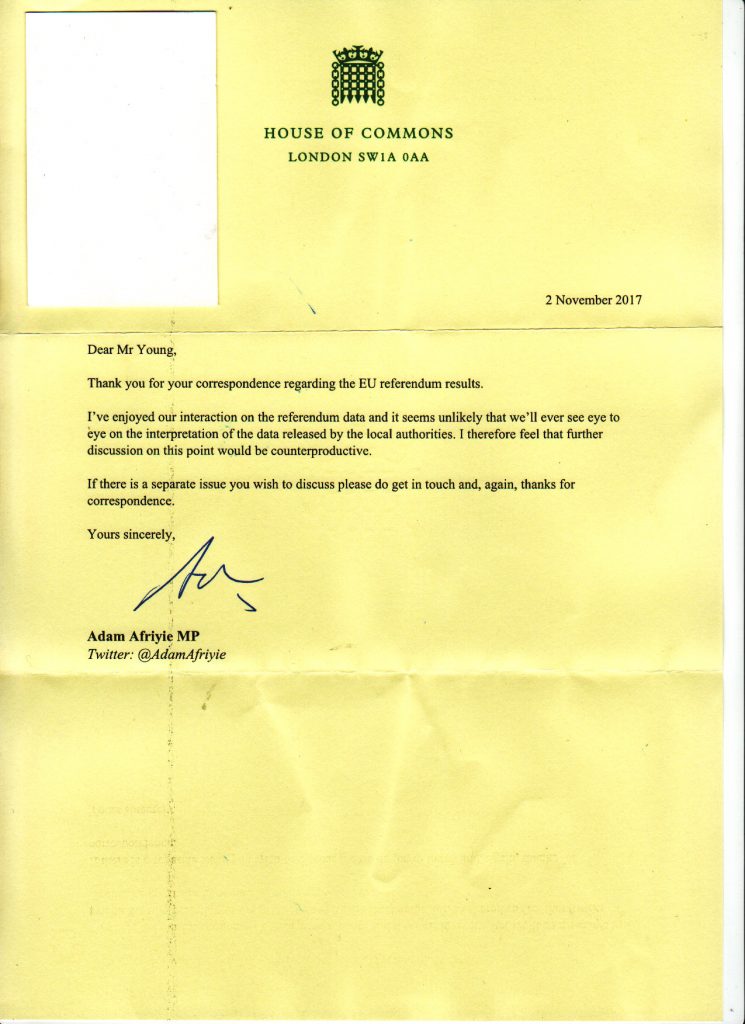
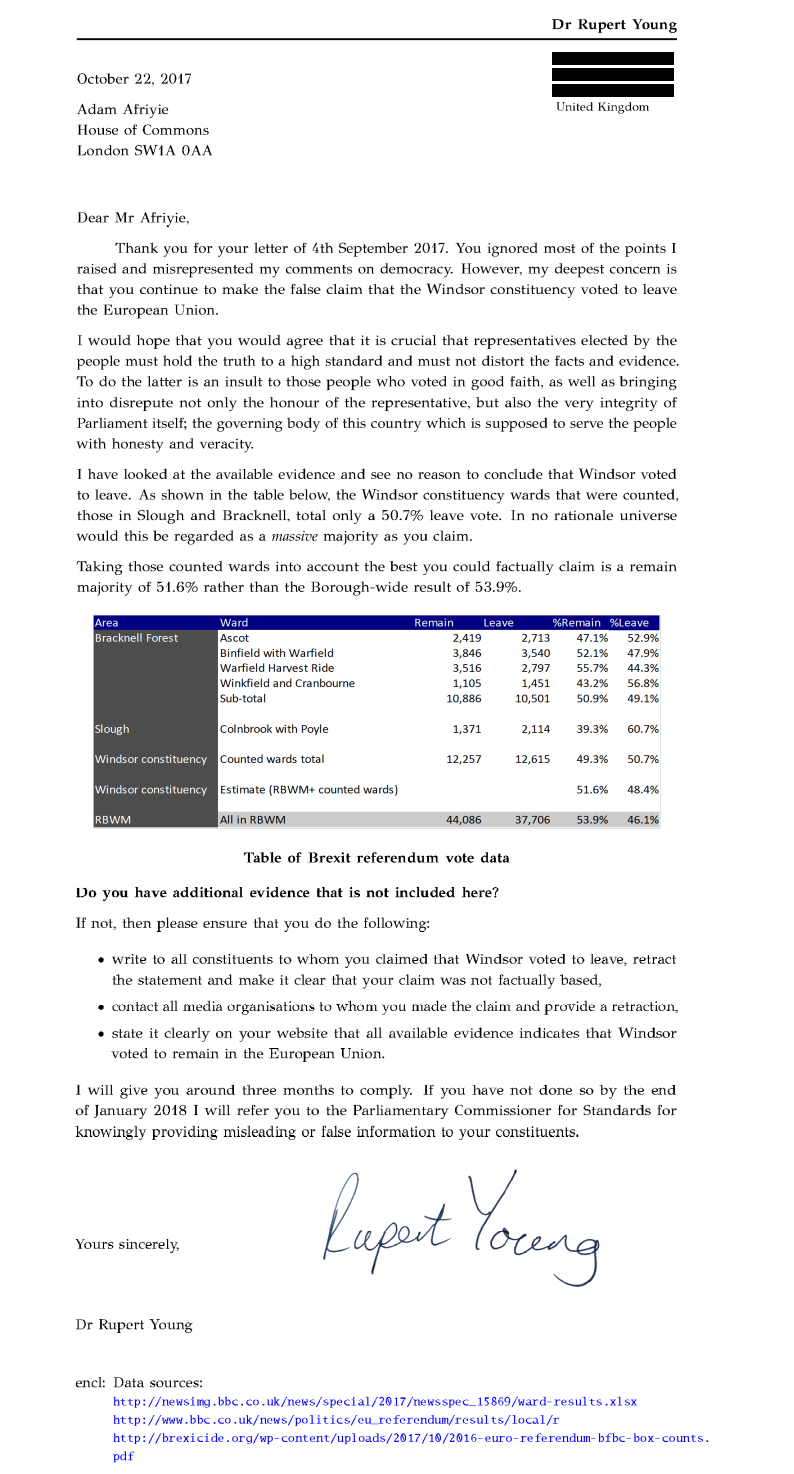
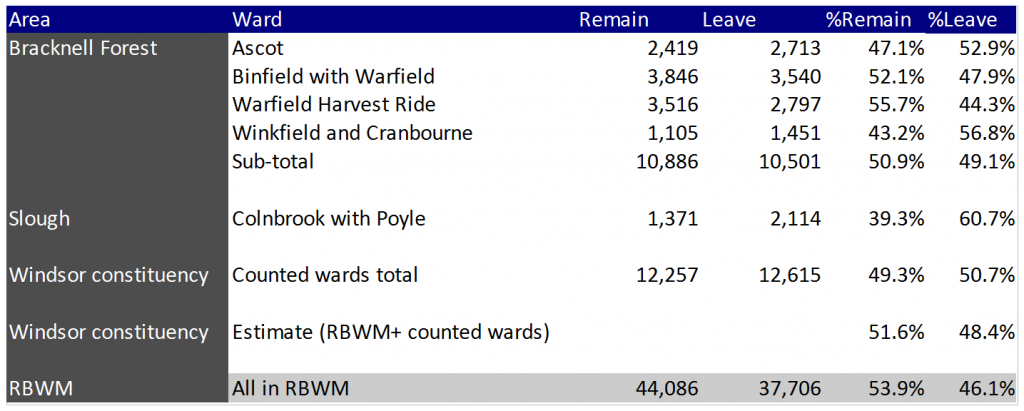
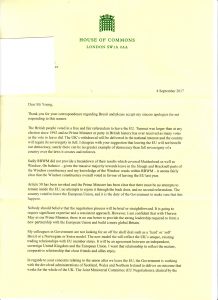
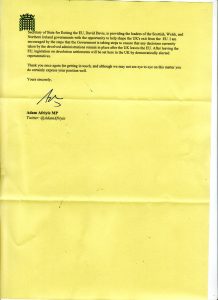
I hardly call it an overwhelming majority. It was small majority, after years of lies in the tabloids, followed by months of lies from the Brexitteers.
From the MP’s code of conduct:
III. Duties of Members
6. Members have a general duty to act in the interests of the nation as a whole; and a special duty to their constituents.
This to HIS constituents (ambiguous here, but clear elsewhere) and to the UK as a whole (nation is singular). His constituency was “Remain”, therefore he should only support Brexit if he overwhelmingly believes it is for the good of the UK, and the clause for Openness means his reasoning should be questionable.
Even if the constituency was Leave, the two would still have to be balanced. Stating them as only the “Will of the People” is in breach of his responsibilities as an MP.